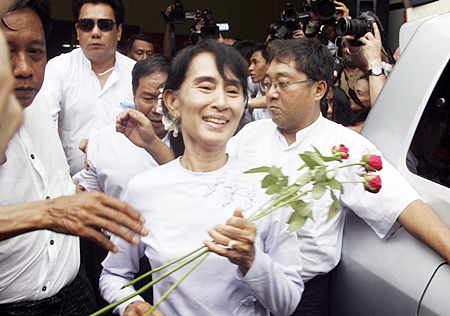Myanmar pro-democracy leader Aung San Suu Kyi receives flowers from supporters as she leaves the headquarters of her National League for Democracy party in Yangon, Myanmar Monday, April 2. Suu Kyi claimed victory Monday in Myanmar’s historic by-election, saying she hoped it will mark the beginning of a new era for the long-repressed country. (AP Photo/Khin Maung Win)
Yangon, Myanmar (AP) – Aung San Suu Kyi claimed victory Monday in Myanmar’s historic by-election, saying she hoped it would mark the beginning of a new era for the long-repressed country.
Suu Kyi spoke to thousands of cheering supporters who gathered outside her opposition party headquarters a day after her party claimed she had won a parliamentary seat in the closely watched vote.
 Myanmar pro-democracy leader Aung San Suu Kyi receives flowers from supporters as she leaves the headquarters of her National League for Democracy party in Yangon, Myanmar Monday, April 2. Suu Kyi claimed victory Monday in Myanmar’s historic by-election, saying she hoped it will mark the beginning of a new era for the long-repressed country.
Myanmar pro-democracy leader Aung San Suu Kyi receives flowers from supporters as she leaves the headquarters of her National League for Democracy party in Yangon, Myanmar Monday, April 2. Suu Kyi claimed victory Monday in Myanmar’s historic by-election, saying she hoped it will mark the beginning of a new era for the long-repressed country.
(AP Photo/Khin Maung Win)
Official confirmation of the results could take days, but the people of Myanmar have reacted with jubilation.
“The success we are having is the success of the people,” Suu Kyi said, as a sea of supporters chanted her name and thrust their hands into the air to flash “V’’ for victory signs.
“It is not so much our triumph as a triumph of the people who have decided that they have to be involved in the political process in this country,” she said. “We hope this will be the beginning of a new era.”
If confirmed, Suu Kyi will take public office for the first time and lead a small bloc of opposition lawmakers in Myanmar’s military-dominated Parliament.
The victory would mark a major milestone in the Southeast Asian nation, which is emerging from a ruthless era of military rule, and an astonishing reversal of fortune for a woman who became one of the world’s most prominent prisoners of conscience.
Unofficial counts continued to trickle in Monday from poll watchers within Suu Kyi’s party, and spokesman Han Than said the opposition had won at least 43 of the 44 parliament seats it had contested. Those included all four seats up for grabs in the capital, Naypyitaw, which is populated by civil servants and would be an embarrassing sign of defeat for the government.
The former junta had kept Suu Kyi imprisoned in her lakeside home for the better part of two decades. When she was finally released in late 2010, just after a general election that was deemed by most as neither free nor fair, few could have imagined she would so quickly make the leap from democracy advocate to elected official – opening the way for a potential presidential run in 2015.
But Myanmar has changed dramatically over that time. The junta finally ceded power last year, and although many of its leaders merely swapped their military uniforms for civilian suits, they went on to stun even their staunchest critics by releasing political prisoners, signing cease-fires with rebels, relaxing press censorship and opening a direct dialogue with Suu Kyi, who was awarded the Nobel Peace Prize in 1991 while under house arrest.
Hoping to convince the international community of its progress, Myanmar invited dozens of Western and Asian election observers to monitor the vote and granted visas to hundreds of foreign journalists.
Suu Kyi herself said Friday that campaigning had been marred by irregularities and could not be considered fair – allegations her party reiterated Sunday.
The topdown revolution has left Myanmar befuddled and wondering how it happened – or at least, why now? One theory says the military-backed regime had long been desperate for legitimacy and a lifting of Western sanctions, and its leadership had quietly recognized that their impoverished country, formerly known as Burma, had fallen far behind the rest of skyscraper-rich Asia.
Sunday’s by-election was called to fill 45 vacant seats in Myanmar’s 664-member bicameral assembly, and the military-backed government had little to lose by holding it. The last vote had already been engineered in their favor – the army was allotted 25 percent of the seats, and the ruling party won most of the rest.
David Scott Mathieson, an expert on Myanmar for Human Rights Watch, said “the real danger of the by-elections is the overblown expectations many in the West have cast on them.”
“The hard work really does start afterward,” he said. “Constitutional reform, legal reform, tackling systemic corruption, sustainable economic development, continued human rights challenges … will take many years.”




